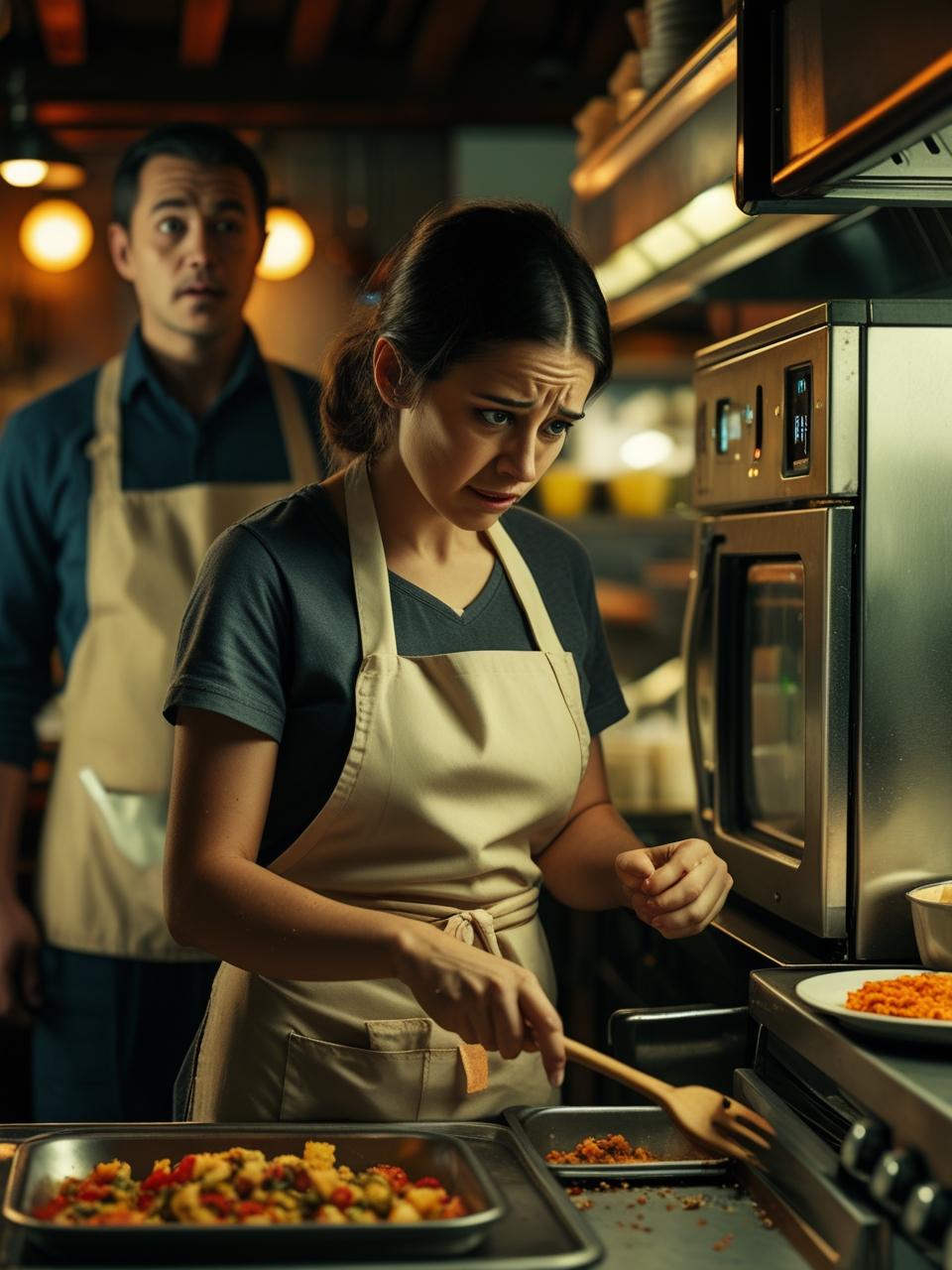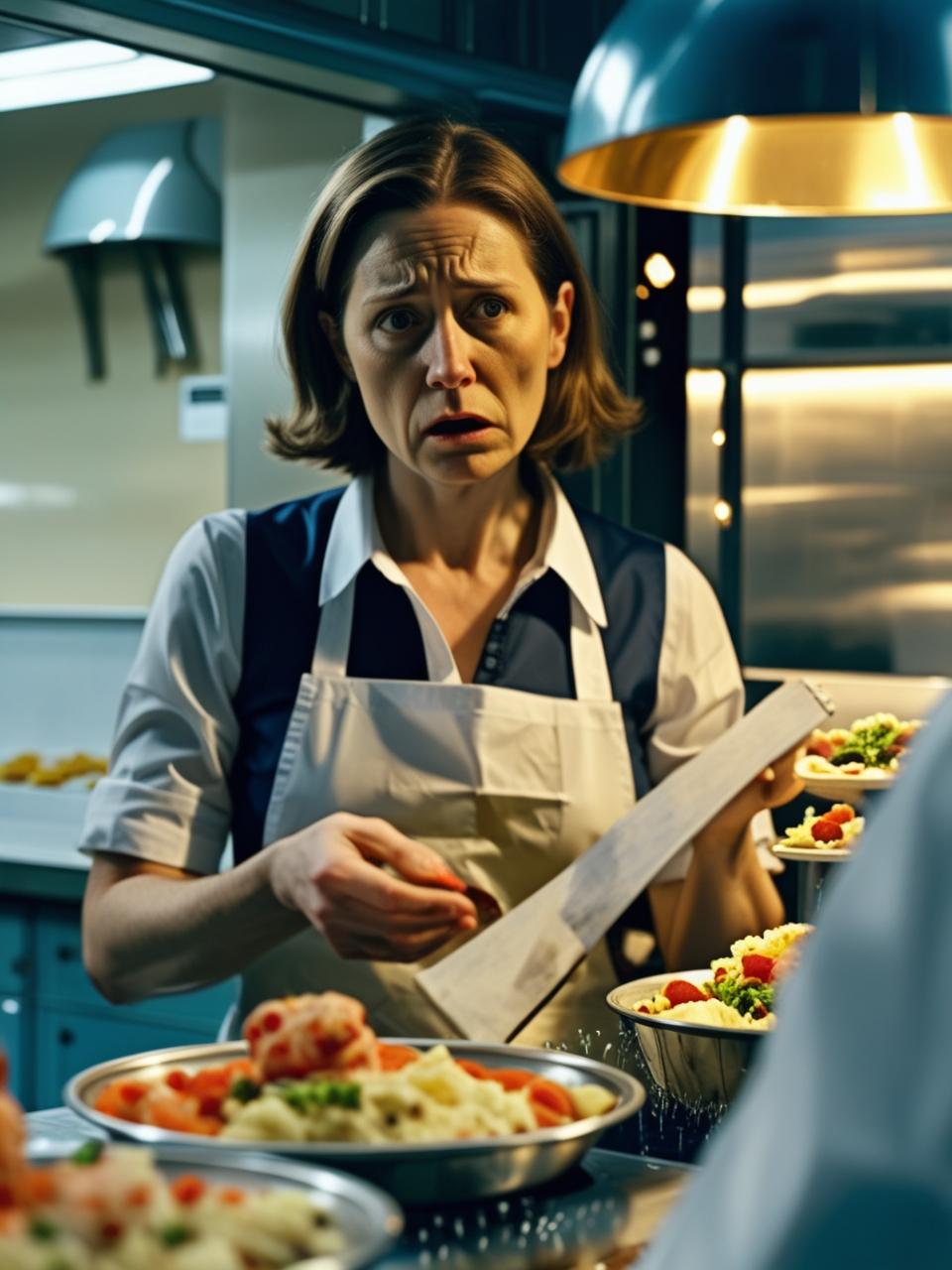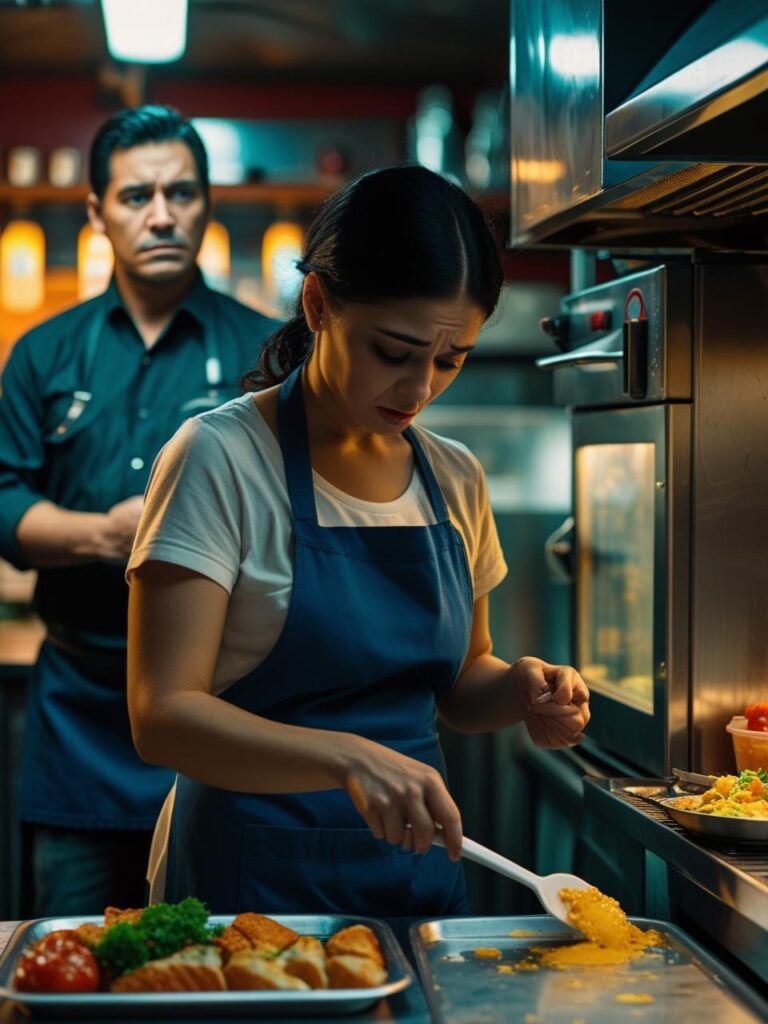George had a top-notch manager, Colt Farlow, a man obsessed with efficiency and profit. But George, the owner of “The Gilded Spoon,” a restaurant renowned for its exquisite cuisine, still liked to check in unexpectedly. It was his way of keeping a pulse on the heart of his establishment. That’s how, one quiet night, he found himself witnessing something that would forever alter his perception: one of his night cleaners, Consuelo Ruiz, was quietly, meticulously, taking leftovers home.
The kitchen usually closed at 10:30 p.m., the vibrant energy of the dinner rush replaced by the hum of industrial dishwashers. After the chefs went home, leaving spotless stations, the cleaning crew of three took over, scrubbing every corner, every surface.
One night, around 1 a.m., George stopped by to check on his prized wine collection in the back cellar. As he walked through the hushed kitchen, a flicker of movement caught his eye. He noticed one of the cleaners, a woman whose face was etched with a quiet weariness, carefully scraping leftover steak into a plastic bag tucked under her apron. She rinsed the plate, placed it in the dishwasher with practiced ease. Then she did the same with another dish—this one had almost a full serving of Chicken Kyiv, a dish that commanded a hefty price on his menu. George instinctively stepped back, melting into the shadows, and quietly watched. The woman, Consuelo, looked to be in her mid-forties, her shoulders slumped, her movements precise but tired.
Just then, Colt, his manager, strode into the kitchen, his voice sharp, cutting through the silence. “Ruiz! Shut your trap and stop your pilfering. I want to close up!”
Consuelo flushed a deep, painful red, her shoulders hunching further. She lowered her head, her dignity visibly crumbling, and quietly finished loading the washer. Then, without a word, she slipped into the locker room while another cleaner started on the floors, the harsh scent of disinfectant filling the air.
George stayed out of sight, his heart a strange mix of anger at the perceived theft, and a prickle of unease at Colt’s callousness. When the staff finally left through the back door, he quietly followed. He watched as Consuelo pulled her thin coat tighter against the chill of the night and walked alone, her steps quick and purposeful, down a dark, narrow alley. A few blocks away, she entered an old, dilapidated industrial building, its windows dark, its facade crumbling.
And what George discovered next? It changed everything he thought he knew about his restaurant, about his staff, and about the very meaning of true hunger.
George slipped through a side door of the industrial building, the air inside thick with the scent of damp concrete and something else… something warm, like simmering broth. He followed the faint glow of a single, bare lightbulb, his footsteps echoing in the vast, empty space. He found Consuelo in a small, surprisingly clean corner, not alone.

She wasn’t just feeding herself. She was meticulously portioning the leftover steak and Chicken Kyiv onto worn plastic plates, handing them to a small group of silent, hungry faces. There were three small children, their eyes wide and hopeful, huddled together. An elderly woman, frail and shivering despite the layers of clothing. And a young man, his face gaunt, holding a baby wrapped in a thin blanket. Consuelo moved among them with a quiet grace, a gentle word for each, a touch of comfort. Her face, no longer tired, was illuminated by a fierce, protective love. This wasn’t theft; this was an act of profound, desperate compassion.
George felt a lump form in his throat, a sharp pang of shame for his earlier judgment. He remembered his own childhood, the lean years, the gnawing hunger. He remembered his mother, stretching every meal, making miracles out of scraps. This wasn’t a cleaner stealing; this was a guardian angel, feeding a hidden community in the shadows of his prosperous city.
He stepped forward, his shadow falling across the small group. Consuelo gasped, her eyes wide with terror, clutching the last plate of food protectively. The children whimpered, shrinking back.
“Consuelo,” George said, his voice soft, devoid of anger. “What is this?”
Tears welled in her eyes, her shoulders shaking. “Please, Mr. George,” she whispered, her voice raw with shame. “I… I only take what would be thrown away. My children… and these families… they have nothing. I promise, I work hard. I just… I couldn’t let it go to waste.”
George knelt, his gaze meeting hers. “You’re feeding them,” he stated, not as an accusation, but as a dawning realization. “You’re feeding a community.” He looked at the children, their innocent faces, then back at Consuelo. “Why here? Why not tell me?”
She looked down, a profound sadness in her eyes. “Who would believe a cleaner, Mr. George? I lost everything in the downturn. My husband, he… he got sick. I lost my restaurant.”
Lost her restaurant? George’s mind reeled. “Your restaurant?”
Consuelo nodded, her voice barely audible. “Before I was a cleaner, Mr. George, I was a chef. A head chef. My own small place, ‘La Cocina de Consuelo.’ It was nothing like The Gilded Spoon, but it was mine. Until the medical bills, until everything collapsed.” She looked up, a flicker of pride in her tired eyes. “I trained under Chef Antoine Dubois, before he retired. He taught me everything.”
George froze. Chef Antoine Dubois. His own mentor. The legendary chef who had taught George everything he knew, who had instilled in him the philosophy that food was love, a gift to be shared. Dubois had often spoken of a brilliant, compassionate young protégé, a woman named Consuelo, who had a soul in her cooking. He had wondered what had become of her.

The pieces clicked into place with a stunning, heartbreaking clarity. This wasn’t just a cleaner. This was a lost culinary artist, a woman of immense talent and even greater heart, brought to her knees by life’s cruelties, quietly performing miracles in the shadows.
“Consuelo,” George said, his voice thick with emotion, “I know Antoine. He spoke of you. He said you had magic in your hands.” He stood, extending his hand, not to fire her, but to lift her up. “Come back to The Gilded Spoon. Not as a cleaner. As my new Head Chef.”
Consuelo stared, utterly stunned, her mouth agape. The children, sensing the shift in atmosphere, looked up, their eyes wide.
“And,” George continued, his voice firm, “we’re going to use all the restaurant’s leftovers. Every single edible scrap. We’re going to set up a proper kitchen here, a real soup kitchen. And you, Consuelo, will run it. With my full support, and The Gilded Spoon’s resources.”
The transformation was breathtaking. Consuelo, initially hesitant, blossomed under George’s trust. Her cooking, infused with her soul, brought a new depth, a new warmth to The Gilded Spoon. Customers raved, not just about the exquisite flavors, but about a newfound “heart” in the food. The staff, witnessing George’s incredible act of compassion and Consuelo’s quiet dignity, were inspired. Colt, the manager, humbled by the revelation, became a silent supporter, even volunteering at the new “Community Kitchen” George and Consuelo established in the industrial building.
The story spread like wildfire. “The Gilded Spoon” became famous not just for its Michelin stars, but for its profound generosity, its commitment to feeding the hungry. Consuelo, the “cleaner who became a chef,” became a local legend, her past struggles now a testament to her resilience.
And George? He found a purpose beyond profit, a profound satisfaction in using his success to uplift others. He looked at Consuelo, bustling in his kitchen, her face alight with passion, and knew that the greatest treasures weren’t in his wine cellar, but in the human connections forged by kindness, and the unexpected miracles found in the most unlikely of places. The day he followed a cleaning lady down a dark alley, he didn’t just discover a secret; he discovered the true soul of his restaurant, and the deepest meaning of his own life
Beta feature
Beta feature


